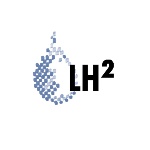Anna Mareike Kostelecky is doctoral researcher at the Department of Hydromechanics and Modelling of Hydrosystems and member of the International Research Training Group (IRTG) 2160 "Droplet Interaction Technologies". On Thursday, 13th June 2024, she will give her milestone-presentation:
Date: Thursday, 13th June 2024
Time: 9:10 am CET
Title: "Modeling and analysis of local thermal non-equilibrium processes at the interface between free- and porous media flow"
Place: IBZ, Robert-Leicht-Straße 161, 70569 Stuttgart
Abstract
The accurate description of heat transfer processes in coupled free-flow and porous media systems is of great interest in many geophysical as well as technical applications. In geothermal energy systems, an understanding of the ongoing processes is crucial for optimising heat extraction from reservoirs and contributing to sustainable energy production. Furthermore, evaporation from porous media leads to a cooling effect, which is essential for understanding drying of soil in greater detail and improving the efficiency of cooling technologies. Furthermore, in fuel cells, the management of heat generated during electrochemical reactions is of vital importance for enhancing performance and the lifespan of the fuel cell. Considering local thermal non-equilibrium (LTNE) for these applications is important because high temperature gradients, significant differences in thermal conductivities as well as transient conditions can make the assumption of instantaneous heat transfer invalid.
In collaboration with partners from the university of Bergen, we investigate the interfacial heat transport within the porous medium with models on different scales. On the pore-scale, where we employ a so-called dual network model, the geometric effects are accounted for and are identified as a significant influence on the heat transfer. However, standard formulations of the effective thermal conductivities for REV-scale models are found to neglect this effect.
The developed and recent implemented coupling conditions for the free-flow to dual-network coupling enables us to investigate more complex systems, as for e.g. for self-pumping transpiration cooling devices, in greater detail. Moreover, first ideas are developed to include the interfacial heat transfer between multiple fluid phases and the solid matrix. An outlook on the further research involving comparison studies of different models as well as extending the existing models will be presented.
Contact



